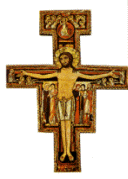
A BRIEF RECENT HISTORY
OF THE CONFRATERNITY OF PENITENTS
As stated elsewhere, the Confraternity of
Penitents (CFP) was founded as the Brothers of
Sisters of Penance (BSP) in 1995. Our Statutes,
which are the adaptations for modern
circumstances of the Rule of 1221, were
submitted in 1998 to the Diocese of Providence,
Rhode Island, where, after a few changes were made by
Diocesan officials, they were reviewed and
deemed acceptable to live by Bishop Robert Mulvee. Slight additional adaptations were
accepted by the Diocese of Providence in 1999.
In 2005-06, with Diocesan input, the governance of
the Confraternity was restructured to make it
more of a religious model, the Constitutions
were reworked to bring them into uniformity with
Church protocol, and the Statutes, as
scrutinized by the Diocese of Providence in 1998
and 1999, were incorporated into the
Constitutions. The CFP Constitutions are of
crucial importance since they are the way we
live the Rule.
In April 1999, the BSP was legally incorporated
in the State of Rhode Island. In November of
1999, federal non-profit tax exempt status was
granted to the incorporated BSP.
In 1998, with the permission of Bishop Mulvee,
our founder put the Brothers and Sisters of
Penance on
the internet, using space on a friendís website.
This step greatly expanded the membership. Also,
in 1998, the formation lessons for the four
years of formation began to be written, since
these are required by the Statutes. In 2002,
upon completion of their formation lessons, the
first two members, both from Rhode Island, made
the Associationís first Life Pledges to the then
current Visitor of the BSP.
In 1999 the Brothers and Sisters of
Penance further expanded when the leadership
and membership merged with another group from
another Diocese who were also living the Rule of
1221 with the support of their Bishop. Members
of that group could now enjoy the same legal
and tax exempt status as the BSP. After
1999, the resources, including a new website
owned by the BSP, membership, and documents of
the BSP, expanded, but still using the same
Statutes as were reviewed by the Diocese of
Providence in 1998 and 1999.
After about three and one half years,
disagreements among the leaders arose over
governance, formation,
pledging, and communication procedures. Ten
months of communications and discussions could
not resolve the disagreements. When the Council
of the Association learned of and became divided over these
issues, the founder went to the Diocese of
Providence in August 2003 to ask for advice. She
was advised to refound the Association. The
Bishop of the Diocese, Bishop Robert Mulvee,
concurred with this advice. Several other
leaders of the BSP agreed. This means that they
resigned from the BSP and started a new
Association which legally had to receive a new
name. The name chosen is the
Confraternity of Penitents (CFP). After
consulting a lawyer, these leaders turned over
the BSP treasury, assets, and material resources
of the BSP to the remaining leaders. In
addition, the BSP website and passwords, which
had been managed from Rhode Island since 1998,
were transferred to the remaining leaders. Some
of the membership of the BSP also voluntarily
left the BSP and joined the Confraternity of
Penitents while others stayed with the former
foundation.
The Brothers and Sisters of Penance,
incorporated in the State of Rhode Island in
1999, had to be legally dissolved in October
2003 since no Rhode Island members remained. The
Confraternity of Penitents was incorporated in
Rhode Island in 2003 and was granted tax exempt
status by the federal government in 2004. In the
CFP, the formation lessons, pledging procedures,
requirements for leadership and voting, and how the Rule is
lived (the original Statutes) have continued
unchanged since Diocesan acceptance in 1998 and
1999, thus effecting a true "refounding" rather
than the creation of a different group.
The remaining leadership of the BSP had to
refound in their own state since the BSP was
legally dissolved in Rhode Island where it had
been incorporated. Since the dual refounding in
2003, one would expect that the two groups would
diverge in the way they live the Rule of 1221
(Statutes) and structurally. This has indeed
happened. While the members of both groups are living the Rule of 1221, each group
lives the Rule differently. There are also other
groups which live the Rule of 1221 or take it as an ideal
or inspiration. In addition, some people who do not belong
to any Association are inspired by the Rule of
1221 or live it in some way.
We have to remember that the Rule of 1221 has
existed for almost 800 years. Is this renewed
interest in the Rule of 1221 just a passing fad
of human creation? Or does it come from the Holy
Spirit to bring closer to Christ those whom the
Spirit calls to explore the Rule? If the latter
is correct, then we all have to discern how we
are to answer the call we have received.
--Jim Nugent (Jim
Nugent has first-hand experience with the
history of the Confraternity of Penitents since
the Holy Spirit's initial inspiration to "live
the Rule of 1221" in 1994.)


